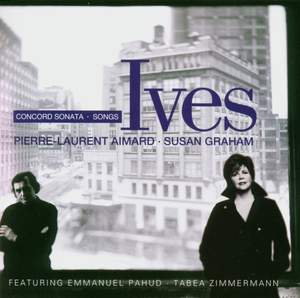Ives: Piano Sonata & Songs
Pierre-Laurent Aimard (piano), Susan Graham (mezzo-soprano), Emmanuel Pahud (flute), Tabea Zimmermann (viola)
It's a conceptual collage fraught with intellectual and technical difficulties...which makes Pierre-Laurent Aimard a near-perfect match, a pianist who revels in Ives's ideas and who's equal to... — More…
-
Gramophone MagazineJune 2004Editor's Choice
Downloads
What are FLAC and MP3?Contents
Ives, C: The Things our Father Loved
Work length2:03
$1.00
$1.30
- Susan Graham (mezzo-soprano), Pierre-Laurent Aimard (piano)
Ives, C: The Housatonic at Stockbridge
Work length3:53
$1.00
$1.30
- Susan Graham (mezzo-soprano), Pierre-Laurent Aimard (piano)
Ives, C: From The Swimmers
Work length1:39
$1.00
$1.30
- Susan Graham (mezzo-soprano), Pierre-Laurent Aimard (piano)
Ives, C: Memories: (A) Very Pleasant; (B) Rather Sad
Work length2:27
$1.00
$1.30
- Susan Graham (mezzo-soprano), Pierre-Laurent Aimard (piano)
Ives, C: Ann Street
Work length0:55
$1.00
$1.30
- Susan Graham (mezzo-soprano), Pierre-Laurent Aimard (piano)
Ives, C: Serenity
Work length2:19
$1.00
$1.30
- Susan Graham (mezzo-soprano), Pierre-Laurent Aimard (piano)
Ives, C: ‘1, 2, 3'
Work length0:35
$1.00
$1.30
- Susan Graham (mezzo-soprano), Pierre-Laurent Aimard (piano)
Ives, C: Songs My Mother Taught Me
Work length3:26
$1.00
$1.30
- Susan Graham (mezzo-soprano), Pierre-Laurent Aimard (piano)
Ives, C: The Circus Band
Work length2:25
$1.00
$1.30
- Susan Graham (mezzo-soprano), Pierre-Laurent Aimard (piano)
Ives, C: The Cage
Work length0:45
$0.70
$0.90
- Susan Graham (mezzo-soprano), Pierre-Laurent Aimard (piano)







